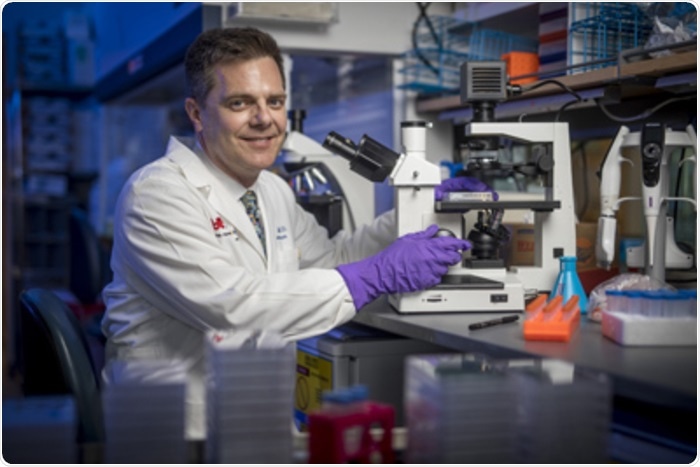Scientists from the Vanderbilt University Medical Center have discovered that individuals recovering from COVID-19 and those vaccinated against the causative virus, SARS-CoV-2, produce identical clones, or groups, of antibody-producing white blood cells.

James Crowe, Jr, MD, director of the Vanderbilt Vaccine Center. Image Credit: Vanderbilt University Medical Center.
Their findings throw light on the selection pressures driving the occurrence of SARS-CoV-2 variants that have the ability to evade naturally occurring antibodies and those induced by vaccination. The results have been published in the Cell Reports journal.
Existing vaccines—including those that employ genetic material, mRNA, encoding a viral protein to induce an immune response—are greatly protective against the delta variant now sweeping through unvaccinated populations worldwide. However, researchers are concerned about the emergence of other variants that are more virulent and transmissible—even among already vaccinated populations.
The results of the new study will aid researchers to develop more efficient vaccines and antibody therapies against a wider range of variants.
We were surprised to discover that there are so many shared antibodies between individuals after SARS-CoV-2 infection, but that is a good sign. It was encouraging to find that an mRNA vaccine also induces those clones, which in part explains why these antibodies work so well in so many people.”
James Crowe, Jr, MD, Study Corresponding Author and Director, Vanderbilt Vaccine Center
Crowe also holds the Ann Scott Carell Chair and is Professor of Pediatrics and Pathology, Microbiology & Immunology at VUMC.
Antibodies are proteins produced by specialized white blood cells named B lymphocytes, or B cells. Once a virus attaches to the surface of a B cell, it stimulates the cell to divide and mature into a clone of identical cells.
The mature B cells, known as plasma cells, secrete millions of antibodies into the lymphatic system and bloodstream, some of which binds to the virus and prevents it from infecting its target cell.
The researchers discovered 27 public clonotypes, genetically similar clones of antibodies, which were shared by COVID-19 survivors and by uninfected people who had been vaccinated against SARS-CoV-2.
A majority of the public clonotypes were generated against part of the viral surface “spike” or S protein that binds to a specific receptor on the surface of cells in the lungs and other tissues. This part of the S protein is variable, which means it can change or mutate, in ways that could make the virus virtually invisible to circulating antibodies.
When most people independently produce the same antibody against the variable part of the S protein, this might exert selective pressure on it to mutate. Researchers believe this to be the reason why the delta variant of SARS-CoV-2 is more infectious and transmissible from person to person than the original strain of the virus,
In the current research, scientists, for the first time, identified two public clonotypes recognizing another, more conserved part of the S protein that fuses with the cell membrane. Once fusion takes place, SARS-CoV-2 enters its target cell, where it hijacks the cell’s genetic machinery to copy itself.
Neutralizing antibodies that attach to the conserved part of the S protein are of interest as this part of the protein is less probable to mutate. Variants of SARS-CoV-2 may hardly evade vaccines and antibody therapies when its less mutable “Achilles heel” is targeted.
Source:
Journal reference:
Chen, E. C., et al. (2021) Convergent antibody responses to the SARS-CoV-2 spike protein in convalescent and vaccinated individuals. Cell Reports. doi.org/10.1016/j.celrep.2021.109604.